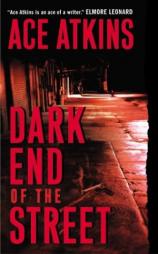Dark End of the Street
Review
Dark End of the Street
Someone recently commented to me that there seemed to be an
overabundance of private investigators plying their wares around
New Orleans in general and the French Quarter in particular. The
French Quarter is only one square mile in area, and it would
certainly seem as if fictional gumshoes would be tripping over each
other if they actually existed in our world. The setting, however,
is irresistible for both writers and readers, and as a result, I
don't think we'll be suffering from a lack of fictional detectives
in New Orleans any time soon.
Ace Atkins is one of the authors who is part of the more recent
wave of novelists whose fictional creations walk the grid of the
Vieux Carre. DARK END OF THE STREET, Atkins third novel featuring
Nick Travers, finds Atkins still in search of his own voice, still
caught somewhere between the absurd but biting commentary of Carl
Hiaasen and the darkness of James Lee Burke. The occasional
geographical errors --- if one turns north from Conti onto Decatur,
one is going down river, not upriver, toward Jackson Square; and
the French Quarter Tipitina's was on North Peters, not Decatur, and
south of Conti --- are minor but unnecessary distractions, as are
the gratuitous political potshots which both Atkins and the reader
would be better off without. Atkins' characters remain lively and
interesting, and his descriptions of Quarter haunts such as
Lafitte's Blacksmith Shop are dead-on.
DARK END OF THE STREET finds Travers, a former professional
football player and current music history professor, attempting to
assist Loretta Jackson, one of his best friends, locate her
brother, Clyde James. James, a legendary soul singer from Memphis,
seemed in the 1960s to be on the threshold of a brilliant career
when his wife and best friend were murdered. James, his life and
mind shattered, turned to the streets and disappeared. He is
believed to be long dead until Loretta is threatened by two
strangers who are seeking James's whereabouts. She goes to Travers,
who finds that the trail to both James and the strangers leads to a
gambling casino in Tunica, Mississippi.
Atkins interjects himself into a situation at the casino and finds
himself involved with Abby MacDonald, a young woman whose parents
were suddenly and mysteriously murdered and who now has some
dangerous individuals after her as well. It develops that
MacDonald's situation dovetails into Travers' own investigation and
that the people who murdered MacDonald's parents, and who are after
her, are also quite interested in the whereabouts of Clyde James.
Atkins gradually uncovers a tale that involves deeds and errors
that took place four decades previously, which will have serious
repercussions in the present. Atkins also faces a danger from his
own past which is wholly unexpected, but no less dangerous for
it.
DARK END OF THE STREET paints a portrait of an area and culture in
uneasy transition, coming to grips with its past while facing the
future. Notwithstanding whatever weaknesses Atkins is still dealing
with as a novelist, his portrayal of the music business in the '60s
in general, and the independent southern record label scene in
particular, is absolutely first rate. You can almost see the 45s
spinning on the turntable, the deals being cut, the books being
juggled. Atkins does everything but name the names; if you know the
scene, however, you know exactly who he's talking about. This is a
man who will undoubtedly continue to grow and develop as a writer,
and will continue to be worth watching and reading.
Reviewed by Joe Hartlaub on January 24, 2011










